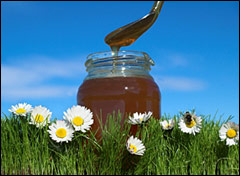Dear Umbra,
I was looking for a nice, local, organic honey to use in reworking some recipes so that they didn’t use sugar. So I headed to Whole Foods, and was stuck looking at a honey in a plastic container labeled organic from Brazil, and a local product in a glass container but not labeled organic. And I started wondering — what makes honey organic? I mean, bees fly. How do you know what plants they ate or pollinated unless you’ve caged them somehow. And that led right to the free-range bee question … Help! It’s too much for my brain. Which honey do I buy?
Liz
Bellevue, Wash.
Dearest Liz,
Bees do indeed freely fly in and out of their hives and are hence inherently free range. As far as I know we do not need to worry about bee imprisonment. I pity the underpaid worker who would go into the bee prison colony to face irate inmates. I also pity the reader who might be subjected to endless bee puns, so I will resist the temptation.

Organic honey: an old hives’ tale?
Photo: iStockphoto
At this point in the history of food, a product cannot make an organic claim unless it has been certified or the producer earns less than $5,000 a year. When an item has been approved by a certifying agency, we can be sure that certain conditions have been met. The beekeeper treated the hives, bees, illnesses, honey harvest, and flower offerings in a way specified by the certifying agency. Organic does not have the non-specific meaning of natural, pesticide-free, everybody frolicking in the fields, shoppers imagining for themselves whatever purity it indicates. When we look at the honey label, we should be able to see what certifying body OK’d the honey as organically produced, and learn exactly what standards were met for this approval to be offered. In what specific kinds of fields did the bees frolic? The answer should be ours for the asking.
What might the standards be for bees? It depends on the certifying body; here in the U.S., the National Organic Program oversees everything, but we are increasingly finding international organic foods such as your Brazilian honey. Foreign certifiers must meet USDA approval, which means their regulations at least equal if not exceed the USDA standard. Factors might include: Hives made of natural materials, painted with non-lead paint. When honey is harvested, enough food must be left for the bees. The beekeeper can’t just kill the colony after he or she has gotten the honey. A long list of prohibited materials must be avoided; these might be used for disease control, for stopping other insects, or as ingredients in the bee-calming “smoker” (a sort of bellows of beekeeping). Post-harvest handling is important, as well. Some standards won’t allow heating beyond a certain point, or high-pressure honey filtration.
Rules about what the bees can eat vary among certifiers, and some indeed prohibit bee access to not only chemical agriculture but also cities and industrial areas. You can imagine the difficulty this presents for would-be organic honey producers.
So, back to your question of what you should buy. If a product is not organically certified, it does not necessarily follow that the product is inundated with chemicals and cruel to bees. The producer may have decided that certification was not worth the effort and fees. Also, I don’t think we know much about bees pollinating conventional crops and how pesticides might affect the resultant honey. With colony collapse disorder looming, there are many theories and concerns about threats to the honeybee population, including mites and pesticides. What is happening to honey is less of a worry than what is happening to our pollinators themselves. In fact, it’s rather unique that consumers are becoming concerned about bee animal welfare before they become concerned about any contamination problems with their honey.
You may know that I generally lean toward local over organic when those are the only two choices. I like to support small businesses and small agriculture — not because it’s necessarily environmentally better in a quantified way, but because the quality of my local landscapes is supported by local producers. In some cases I think it’s fair to assume that small producers are not too far from organic: small growers won’t have the cash or the need to do tons of spraying, nor the cash or need to get certified. In this instance you need to think about what you want from organic honey, and whether you might just get those same things from local honey. If the label seemed legitimately local and small-scale, I would probably go with local, myself. Just my tendency.
I can’t believe I made it through this entire answer without a single pun.
Buzzily,
Umbra

